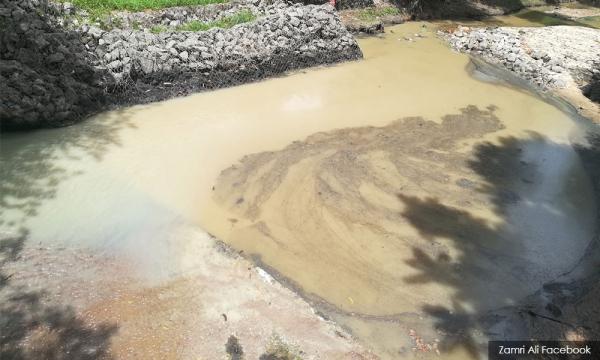After the chemical waste pollution crisis at Sungai Kim Kim in March, once again residents of Pasir Gudang have been hit with another pollution incident since June 20, the cause of which is still unknown.
Based on complaints from victims, the excessive odour had resulted in them suffering shortness of breath and vomiting, and the complaints seem valid as the unpleasant smell was also detected by the Bernama journalist and photographer who surveyed some of the affected areas.
The repulsive rancid smell was more overpowering during a drizzle at several housing areas such as Taman Mawar, Taman Pasir Gudang and Taman Bukit Dahlia not far from the Taman Mawar religious school, the first school which was affected by the incident about 10 days ago.
In fact, the smell could be detected on arrival at the affected sites while sitting in the car with the windows wind up and air-conditioning on, that both Bernama staff felt dizzy and had difficulties breathing.

Several residents who experienced similar symptoms said they were worried about the unpleasant smell adding that the strange odour gets worse at night and after it rains.
Raja Ismail Raja Atan, 45, who lives in Taman Pasir Putih, about 50 metres from Sungai Kim Kim, said the foul and rancid smell worsened and grew more frequent after 10 pm resulting in headaches, dizziness and nausea.
"Actually, we had detected the smell even during the Sungai Kim Kim pollution incident but the stench has become a nuisance as more and more people are experiencing vomiting, nausea, dizziness and so forth," he said when met at his home.
Energy, Science, Technology, Environment and Climate Change Minister Yeo Bee Yin, confirmed three gases namely methyl mercaptan, acrylonitrile and acrolein were detected in the atmosphere during the recent severe air pollution incident in the district.
She said the presence of the three gases would have an effect on high-risk groups such as children and people suffering from asthma.

However, she confirmed that the three gases were not detected in the blood and urine samples of 10 patients from eight schools.
Sharing her experience, bank clerk Farhanah Rahim, 32, who lives in Taman Bukit Dahlia, located less than 3.5 kilometres from the Taman Mawar religious school, said she has gotten used to the mysterious smell which had been lingering in the housing area over the past few months.
"The residents here are accustomed to all kinds of smell in Pasir Gudang because various foul smells will emanate at certain times. The smell can be sickening, decaying or rancid […] and some are difficult to describe," she said adding that her eyes sting and throat hurt when out in the open.
A resident of Taman Mawar, who only wants to be known as Bob expressed his concern and anxiety that such pollution could have a more severe impact on the future of the entire population of the district.
"Several people have experienced vomiting, dizziness, diarrhea, but I'm afraid that in the next two or three years we may have other more adverse effects due to this mysterious smell," he said.

The Ministry of Health in a statement informed that so far 748 people have received treatment and of the total 39 were treated as inpatients.
Earlier, the media reported that 475 educational institutions under the Ministry of Education (KPM) in the Pasir Gudang district were ordered to close for three days, from June 25 to 27, due to gas pollution which occurred last Thursday.
On June 20, 15 students of the Taman Mawar Religious School and 13 Sekolah Kebangsaan Pasir Gudang (4) students suffered breathing difficulties and vomiting believed to be caused by air pollution.
This is the second pollution incident to occur in Pasir Gudang after the toxic chemical waste dumping incident at Sungai Kim Kim three months ago, which saw more than 4,000 people falling ill and 111 schools closed.
Residents of Pasir Gudang have urged the government and the authorities involved to resolve the pollution issue and to identify the cause of the mysterious smell as soon as possible, as they feared the situation would worsen and could be harmful to the people especially children in the affected areas.


